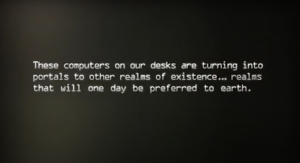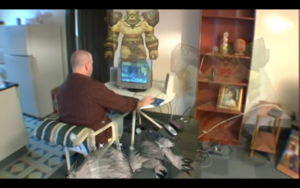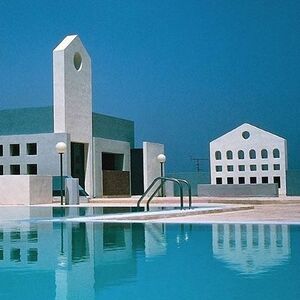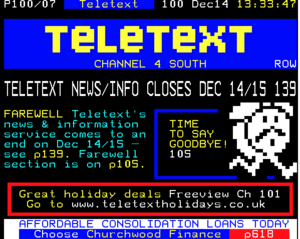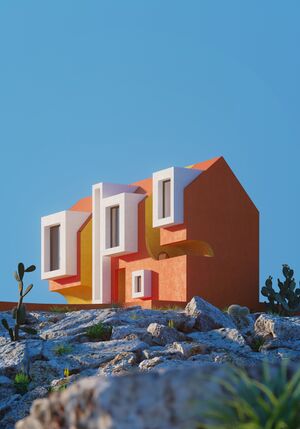User:Kendal/Year 2: Difference between revisions
| Line 91: | Line 91: | ||
<br> https://pad.xpub.nl/p/padoflinks Links I keep losing. | <br> https://pad.xpub.nl/p/padoflinks Links I keep losing. | ||
<br> https://pad.xpub.nl/p/klbprojectproposal | <br> https://pad.xpub.nl/p/klbprojectproposal | ||
[[User:Kendal/Project Proposal]] | |||
<br> https://pad.xpub.nl/p/thesisoutlinekb | <br> https://pad.xpub.nl/p/thesisoutlinekb | ||
Revision as of 16:34, 2 November 2021
Project Ramblings.
IDEA
In a culture of hypercategorisation, what can become of the forgotten spaces of the internet?
With areas of the internet resembling the impoverished wastelands of an Andrea Arnold film, can we turn these spaces into temporary autonomous zones?
Did categorisation & modernisation of the internet create these abandoned places? Can we make them into digital utopias?
Obsolete platforms & forgotten websites as publishing moments. Subverting the intended use (hello affordance)
Many virtual spaces/worlds were created to accommodate some of the social issues that arose from COVID.
These hangouts are as much as abandoned when society reopens. However, they still are taking up space in a server somewhere. What if we could squat them?
rework of the summary again:
With modernisation and a push for categorisation of the internet, early fringe virtual communities were pushed out in favour of walled gardens like Facebook. The digital spaces reflect a form of a non-place, created with the idea of this is what the internet will be in the future but instead abandoned and serving as a snapshot of the past. Take a physical non-place like a mall. These spaces were created as a utopic glimpse into the future and now lay silent and dated, completely a product of the past. How can we activate these digital equivalents as space for creative experiments and making?
If we can occupy these spaces as temporary autonomous zones, can we breathe life into the disused? Can we explore the difference between the virtual and physical world and how we can adapt to create in this environment?
These past ideas of virtual worlds are starkly different from the virtual worlds of today. They encouraged creativity and difference while virtual worlds of today seem to almost always been based on what already exists in the real physical world, 3D office spaces or replicas of landmarks. With the boundless space of the internet, why do we create spaces that already exist? Is it to blur the line between the digital and the physical? What is the real difference between these?
THEMES
obsolete internet | hypermodernisation | hypercategorisation | virtual space | subversion | simulation | temporary autonomous zones | architectural planning | physical vs digital
MOODS
PAD OF CHATS
RESEARCH
WATCH
World on a Wire Dialogues is a joint project by the online platform Rhizome (New York) and Garage Digital, featuring conversations with artists about the implications of simulation practices in digital art.
Part of Assuming Distance: Speculations, Fakes, and Predictions in the Age of the Coronacene by Garage Digital (Moscow)
[Part 1]
LOOK
👀Present Continous
👀Assuming Distance: Speculations, Fakes, and Predictions in the Age of the Coronacene
👀 Sonara Art VIllage - Mary and Davit Jilavyan
👀 Andrea Gruetzner - Photographer Web
👀Alicia Framis - Century 22 EventWeb
👀 Richard England - Architect Web Essay
READ
🏛 Walled Garden - Annet Dekker
🏛 The School of Missing Studies - Sandberg Instituut
Sorting Things Out - Bowker & Star
Temporary Autonomous Zone - Hakim Bey
Delusive Spaces - Eric Kluitenberg
Book of Imaginary Media - Eric Kluitenberg
🏛 The Lifecycle of Software Objects - Ted Chiang notes
Networks Without a Cause - Geert Lovink
Synthetic Worlds - Edward Castranova
To Mend a Broken Internet, Create Online Parks - Eli Pariser (WIRED)
Public Space // The Internet: Public Embodiment of Digital Cultures - Elizabeth Anne Hampton
🏛 Raiders of the Lost Web - Adrienne LaFrance, The Atlantic 2015 Link notes
🏛 Mapping Beyond Dewey's Boundaries: Constructing Classificatory Space for Marginalised Knowledge Domains - Hope A. Olson Link notes
Life on the Screen - Sherry Turkle
Virtual Worlds (Learning in a Changing World Series) - Judy O'Connell & Dean Groom Link
Virtual worlds, real libraries : librarians and educators in Second Life and other multi-user virtual environments - Lori Bell Link
WHO CAN HELP?
🙋🏽♀️ Alicia Framis (AMS) - Simulation to present ideas, overcatergorisation, architecture
🙋🏽♀️ Lilet Breddels (AMS) - Architecture, theory and ideas of inhabiting space
Things I'm Doing
- Constructing a model of a former utopic building that was demolished. I feel it occupies the space between virtual & physical and also an IRL equivalent to these spaces created and abandoned online. Doing this, I hope I can approach the question of the difference between physical and virtual in order to inform what I want these online spaces to function as.
- After further thought, I have also decided to create a model of the virtual world Habbo Hotel. I'm hoping something comes out of making something that exists purely digitally in a physical form. Will it spur imagination?
Step one, gathering as many images to construct a 3D image as possible.
SEE HERE: Visual collection
Step two, drawing the blueprints as best as I can, WIP (will upload later)
Step three, MAKE THE MODEL!!!!!
Aquarium
Graduate Research Seminar
https://pad.xpub.nl/p/padoflinks Links I keep losing.
https://pad.xpub.nl/p/klbprojectproposal
User:Kendal/Project Proposal
https://pad.xpub.nl/p/thesisoutlinekb

